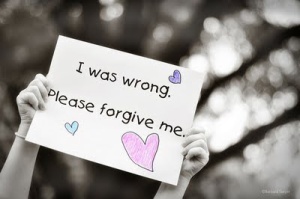2nd Sunday after Pentecost (year B), 2015 (preached 6/7/15)
first reading: Genesis 3:8-15
Psalm 130
second reading: 2 Corinthians 4:13-5:1
gospel reading: Mark 3:20-35
There’s an old saying that I’m sure most of us have heard before – “The more things change, the more they stay the same.”
Our world has changed remarkably in the past one hundred years. There have been amazing life-changing advancements – we’ve gone from riding on horses to speeding in cars and flying in planes, to sending people into space.
We have cures for diseases that used to threaten and kill. Technology allows us to see our insides without a doctor having to make a single cut. Encyclopedias and dictionaries are just about obsolete – if you want to know about something, just google it.
The world is indeed a different place, a changed place, from where it was just a hundred years ago. And it is most certainly different than it was in the time when Jesus taught the crowds in parables. And it is almost a completely different world than the one in which Adam and Eve lived.
But – “The more things change, the more they stay the same.”
It is true that our outer lives, the stuff that surrounds us, differs dramatically from the time of the first people, but INSIDE, we see in our reading from Genesis, that since the beginning of the world itself, we have NOT changed very much.
All the technology and comforts that surround us have not been able to fix our human, instinctive desire to shirk from responsibility for our bad behavior.
Those of us who are parents, or who have cared for children, know this. We “catch” children in a “wrong” activity, and one child says, “It’s not my fault, SHE made me do it!” And the other says, “No, HE made me do it!” Sound familiar? Sounds an awful lot like Adam and Eve.
The more things change, the more they stay the same.
What do most adults in our day and age do when they are confronted with a fault within themselves, or something they shouldn’t have done? We try to shift the blame off of ourselves, to move the responsibility for our bad behavior onto another person, or create some reason to excuse ourselves.
Adam – had the ultimate audacity. He not only pointed the finger at Eve, he point his finger at GOD.
He didn’t just say, “The woman made me do it.” He said, “The woman, whom YOU gave to be with me made me do it.” In other words, “If you hadn’t given her to me Lord, I wouldn’t be in this trouble – so it’s really YOUR fault.” Sounds an awful lot like my son! He also tries to make it MY fault when he does something wrong.
Eve doesn’t do much better. She may not blame God for her mistake, but she also tries to point the blame elsewhere. “The serpent tricked me.” “Don’t look at me Lord. It’s not my fault. It’s the serpent’s fault.” Adam and Eve point the finger of blame at everyone but themselves.
But does it work? Does God excuse Adam because Eve “made” him eat of the tree? Does God excuse Eve because the serpent tricked her into eating from the tree? Nope. God holds all of them, even the serpent, responsible for their behavior, and the role they played in acting out the first sin: disobedience – going against the direct command of God.
The more things change, the more they stay the same.
Human nature has changed very little over these thousands of years. We still do the same, in our society, and even with God – even though we don’t have to.
Why are we so prone to running from our sins, trying to hide them, deny them even to ourselves and to God – when we have a God that is ready and wanting to forgive us?
None of us are without sin, without thoughts and actions we regret, things we wish we hadn’t done. We confess this every Sunday at the beginning of worship. “If we say we have no sin we deceive ourselves and the truth is not in us,” taken from the first letter of John.
But do we allow the deep meaning of those words to enter our hearts? Do we use those words to confront ourselves, to humble ourselves before one another and before the Lord? Or do we say those words and try not to think about it too much, or run from them altogether?
The more things change, the more they stay the same. Adam and Eve learned the hard way that we can’t hide from God, and it’s impossible to run from ourselves. I wonder why, age after age, we have to remind ourselves of this? Why do we run and hide, when through Jesus Christ we have forgiveness of ALL our sins and the gift of eternal life?
As we heard in our second reading, “we know that the One who raised the Lord Jesus will raise us also with Jesus.” And, “For we know that if the earthly tent we live in is destroyed, we have a building from God, a house not made with hands, eternal in the heavens.”
What wonderful words. What wonderful promises.
They should make us unafraid to say, “Yes, I made this mistake. I was WRONG. I’m sorry. Please forgive me.”
But just because the promises should make us unafraid, doesn’t mean they do. Because – the more things change, the more they stay the same.
When most of us think of the story of The Fall, we think of disobedience – the first sin – but perhaps a large part of it is also DENIAL.
Not the kind of denial that is the deep psychological inability to see something – the denial that is the cover up of what we know is wrong.
Political careers, stardom, and even everyday relationships are killed by that kind of denial – it’s been happening since Adam and Eve.
And it’s a shame, because it doesn’t have to be.
For just as “the more things change, the more they stay the same,” is true of our fallen nature – the more things stay the same is also true of God’s nature – forgiveness, given to us through Jesus Christ.
Amen.

